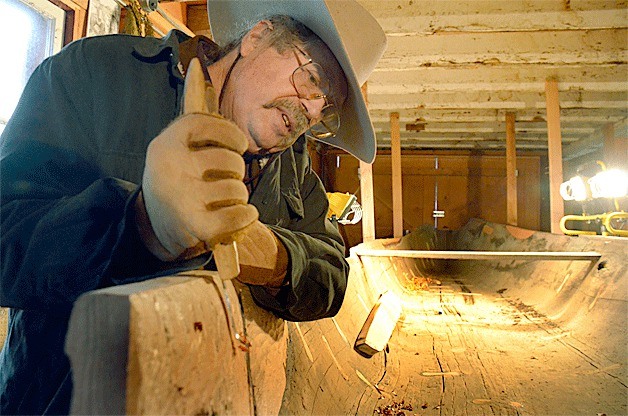Restoration of one of the oldest known Native American canoes in Washington is nearing completion and Island County Historical Society officials have high hopes the artifact will soon be on display inside the Coupeville museum.
Believed to be about 170 years old, the canoe once belonged to renowned Central Whidbey tribal leader Chief Snakelum, and later his equally famous son Charlie Snakelum.
Now under the stewardship of the historical society, the famous craft has been undergoing a long needed overhaul in a barn south of Coupeville since February of last year.
If all goes well, and the weather warms soon, the work is expected to wrap up this spring.
And museum officials are hoping to make the finished canoe a centerpiece in a Native American and natural history exhibit in the museum’s basement.
But to do it, the museum is putting a call out to the community for help.
The basement is currently used for storage and much of it will need to be moved to another location to make room for the new exhibit.
The museum is searching for at least 600 square feet of climate-controlled storage space at a very affordable rate.
“It would be a huge thing for us,” said Rick Castellano, executive director for the historical society and the museum. “The museum was designed to have that floor open to the public when it was built in 1991.”
But equally important, it would help preserve Snakelum’s old canoe, which is one of the museum’s, Central Whidbey’s, and indeed the state’s, great Native American treasures.
“We want the restoration work to last another 170 years,” he said.
Believed to have been built from a single piece of red cedar sometime in the 1840s, the 27-foot craft is not only one of the oldest known canoes in the state but it appears to be continually teaching historians about Native American art.
During the restoration, panels of vertical, light blue paint were found on the craft’s inside walls. The discovery is still pending verification by state experts, but if true, it would be no small thing.
“Light blue is just a color that doesn’t appear in Native American art,” Castellano said.
“That was really an interesting discovery and one that was totally unexpected,” he said.
The restoration began by canoe expert and Sequim resident Steve Brown.
A prior commitment took him away early on, however, and the majority of the refurbishment has been completed by Gordon Grant, a master woodcarver with a background in Native American art.
Grant said it was an honor to be asked to do the work and says the canoe is nothing short of a marvel, starting with the building material.
While the canoe is 170 years old, he estimates the tree it was made from was about 800.
“The grain is so fine you can scarcely see it,” Grant said.
It’s made patching holes and replacing rotted sections somewhat tricky because the grain has to be a close match.
Fortunately, he was able to secure sections of a downed tree from Rockport State Park that’s between 300 and 400 years old.
Approaching the work with a sense of humility, Grant has done most of the repairs using traditional hand tools, most of which he crafted himself from an old circular plow. Only in a few instances has he used modern power tools, he said.
“It just seems appropriate,” Grant said. “The restoration of the canoe is a matter of respect as well as carrying history forward.”
Work has slowed somewhat this past winter largely because of frigid temperatures — it has to be warm enough for some of the glues used to set properly. Grant believes work should be complete by March.
Those with potential storage space for the museum are encouraged to contact Castellano at 360-678-3310.



